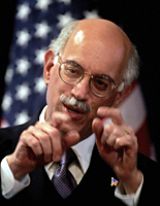US to impose new financial sanctions on Sudan – Natsios
March 14, 2007 (WASHINGTON) — The United States could soon impose new sanctions against Sudan, including restrictions on companies that do business there in U.S. dollars, because of the government’s refusal to accept an international force into Darfur, the U.S. special envoy to Sudan said on Wednesday.
 There are also plans to impose travel bans on and confiscate the savings accounts of three individuals, two politicians accused of “atrocious acts” and a rebel leader who was “obstructionist” in peace talks, U.S. envoy Andrew Natsios told a conference call with nongovernmental groups.
There are also plans to impose travel bans on and confiscate the savings accounts of three individuals, two politicians accused of “atrocious acts” and a rebel leader who was “obstructionist” in peace talks, U.S. envoy Andrew Natsios told a conference call with nongovernmental groups.
Natsios, who was in Sudan last week and met its leaders, said it was up to U.S. President George W. Bush to announce the sanctions, which are part of a “Plan B” to get Khartoum to agree to a joint U.N./African Union force with the goal of stemming the violence in Sudan’s western Darfur region.
Speaking later, U.S. Secretary of State Condoleezza Rice confirmed the United States and others were looking at “other options” to deal with the Darfur crisis.
“It’s simply the case that the Sudanese government needs to recognize that the international community can’t stand idly by while people suffer,” said Rice at a news conference with Israeli Foreign Minister Tzipi Livni.
Neither Rice nor Natsios said when new sanctions would be imposed but the U.S. envoy made clear time was running out.
“Enough is enough, we need to now take action and not just (have) more talk,” he said.
“It’s pretty clear the (U.S.) president is angrier than anyone else on this. He gets very upset when he talks to me about this situation. He is very frustrated by it,” Natsios said.
Natsios declined to provide the names of companies that might be affected by new sanctions but said international transactions involving U.S. dollars would be blocked. He did not name the three Sudanese who would be sanctioned but said they were well-known.
BROAD IMPACT
The threat of U.S. financial sanctions would push banks in Europe and Asia to restrict their business with individuals or businesses in Sudan. China, India and Malaysia are the biggest foreign investors in Sudan.
Natsios said there had been a series of high-level U.S. government meetings before he left for Sudan during which the measures were discussed and agreed on.
“People have been designated within the (U.S.) Treasury to enforce this,” he said.
The sanctions would be imposed by the United States and not the United Nations or another body, but Natsios said Washington hoped other countries would do the same.
The United States and others are increasingly angry at Sudan’s refusal to accept the UN/AU force into Darfur, where more than 200,000 people have been killed since 2003 and more than 2.5 million displaced by the conflict.
Britain wants the U.N. Security Council to impose sanctions on Sudan, including the broadening of an arms embargo and imposing a no-fly zone in Darfur.
The Bush administration threatened to impose “Plan B” against Sudan this January but has held off on taking any action after Sudanese President Omar Hassan al-Bashir gave a loose agreement at the end of last year to allow the first phase of a hybrid force to begin.
Bashir then sent a letter to the United Nations this month arguing in detail against U.N. plans to bolster under-financed AU military monitors.
“We think that the administration has shown too much patience with the Sudanese government,” said David Rubenstein of the Save Darfur Coalition, one of the most vocal activist groups for Darfur.
(Reuters)
